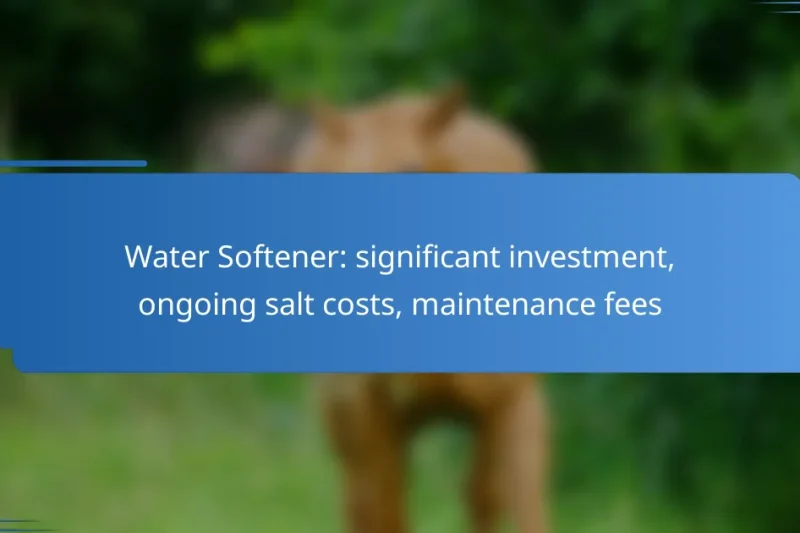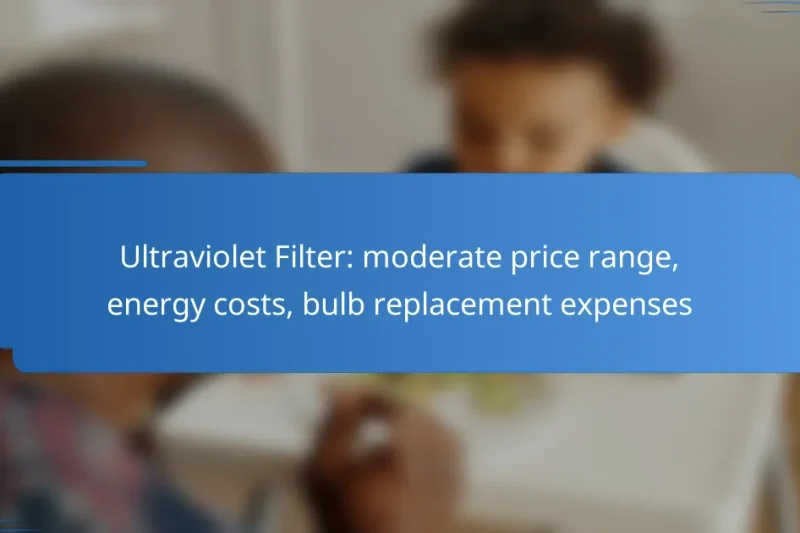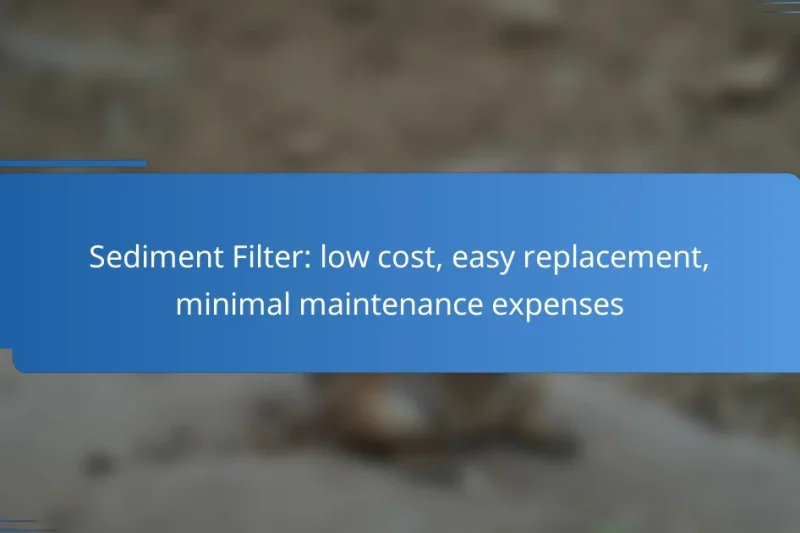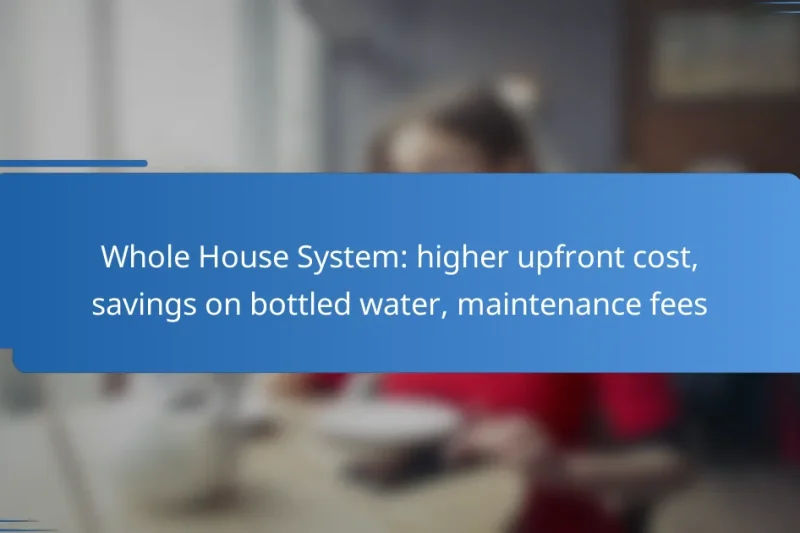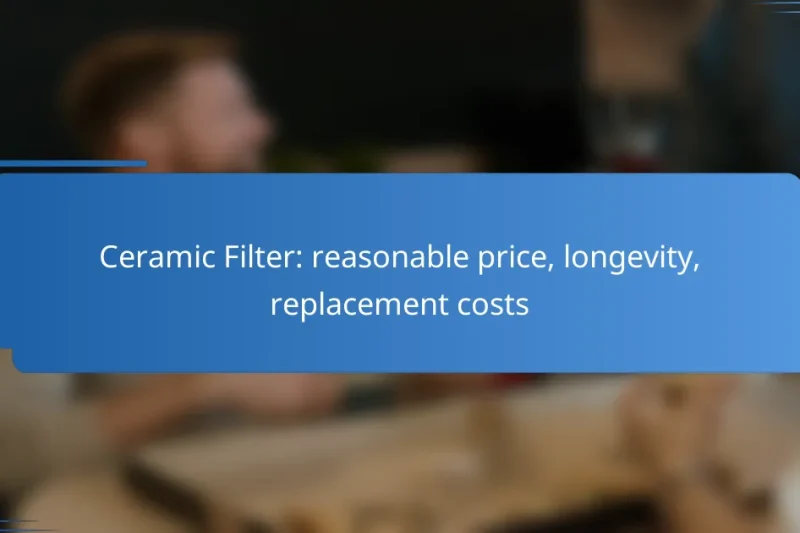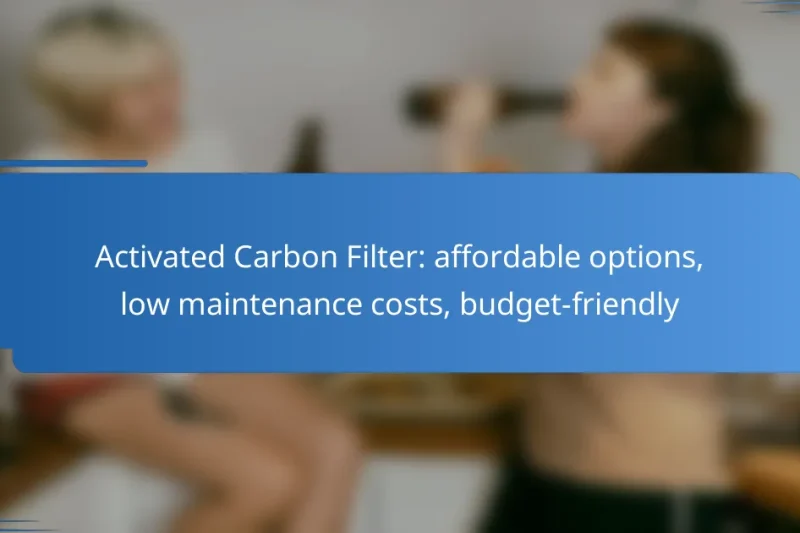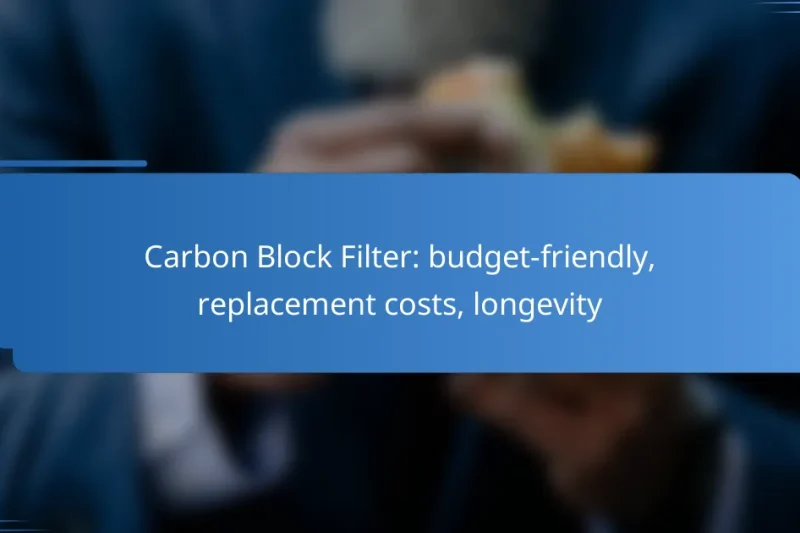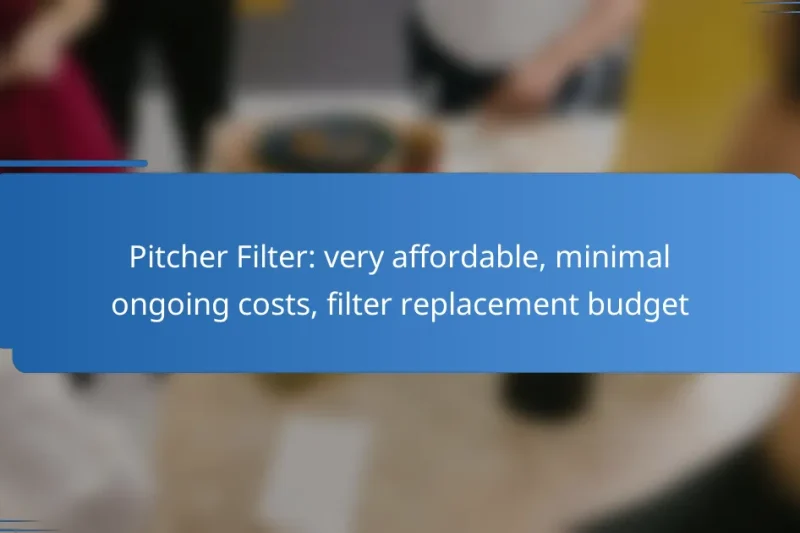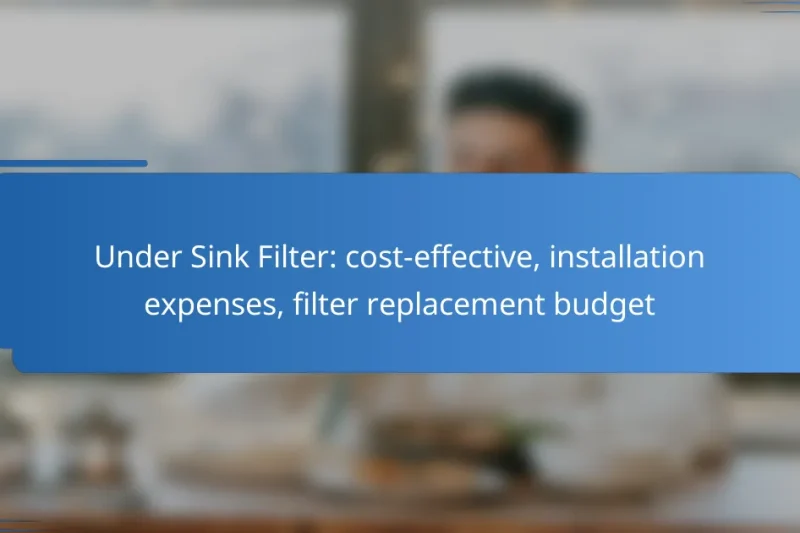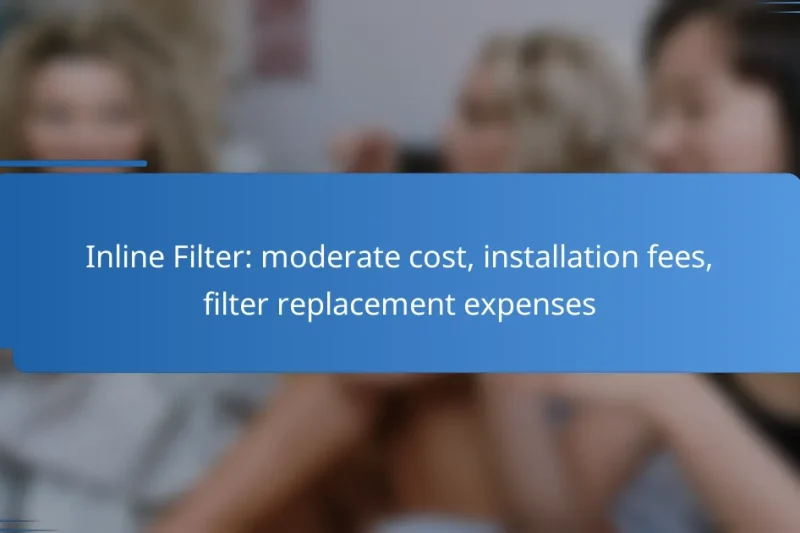Investing in a water softener can greatly improve your home’s water quality, but it comes with … Water Softener: significant investment, ongoing salt costs, maintenance feesRead more
Costs and Pricing of Water Filtration Systems
Water filtration systems come with a wide range of costs influenced by factors such as type, brand, and features. Homeowners may find prices ranging from a few hundred to several thousand dollars, depending on their specific needs and the complexity of the system. Additionally, ongoing expenses like replacement filters and maintenance should be considered for effective budgeting and long-term efficiency.
Ultraviolet Filter: moderate price range, energy costs, bulb replacement expenses
For those seeking a balance between quality and affordability, moderate-priced ultraviolet filters typically range from $50 … Ultraviolet Filter: moderate price range, energy costs, bulb replacement expensesRead more
Sediment Filter: low cost, easy replacement, minimal maintenance expenses
Choosing a sediment filter that is low cost and easy to replace can significantly enhance your … Sediment Filter: low cost, easy replacement, minimal maintenance expensesRead more
Whole House System: higher upfront cost, savings on bottled water, maintenance fees
Investing in a whole house water system may involve a higher upfront cost, often ranging from … Whole House System: higher upfront cost, savings on bottled water, maintenance feesRead more
Ceramic Filter: reasonable price, longevity, replacement costs
Ceramic filters offer an affordable solution for water filtration, typically priced between $20 and $100 in … Ceramic Filter: reasonable price, longevity, replacement costsRead more
Activated Carbon Filter: affordable options, low maintenance costs, budget-friendly
Activated carbon filters offer an affordable solution for purifying air and water while keeping maintenance costs … Activated Carbon Filter: affordable options, low maintenance costs, budget-friendlyRead more
Carbon Block Filter: budget-friendly, replacement costs, longevity
Budget-friendly carbon block filters are an effective solution for reducing contaminants in water while remaining accessible … Carbon Block Filter: budget-friendly, replacement costs, longevityRead more
Pitcher Filter: very affordable, minimal ongoing costs, filter replacement budget
When seeking an affordable pitcher filter, it’s essential to consider both the initial purchase price and … Pitcher Filter: very affordable, minimal ongoing costs, filter replacement budgetRead more
Under Sink Filter: cost-effective, installation expenses, filter replacement budget
Under sink filters offer a cost-effective solution for improving water quality in your home, with three … Under Sink Filter: cost-effective, installation expenses, filter replacement budgetRead more
Inline Filter: moderate cost, installation fees, filter replacement expenses
When considering an inline filter, it’s essential to account for the total costs, which include the … Inline Filter: moderate cost, installation fees, filter replacement expensesRead more
What are the costs of water filtration systems?
The costs of water filtration systems can vary significantly based on the type, brand, and features. Homeowners can expect to spend anywhere from a few hundred to several thousand dollars depending on their specific needs and the complexity of the system.
Average price range for home systems
For basic under-sink or countertop systems, prices typically range from $100 to $500. More advanced options, such as whole-house filtration systems, can range from $1,000 to $5,000 or more, depending on the capacity and technology used.
Installation costs may add another $100 to $500, depending on the complexity of the setup and local labor rates. It’s essential to factor in both equipment and installation when budgeting for a water filtration system.
Factors affecting water filtration system costs
Several factors influence the overall costs of water filtration systems, including the type of filtration technology (e.g., reverse osmosis, activated carbon), the system’s capacity, and any additional features like UV purification or smart technology. Higher-end systems often provide better filtration and longer-lasting filters, which can justify the initial investment.
Maintenance costs should also be considered, as some systems require regular filter replacements that can range from $50 to $300 annually. Additionally, local water quality and specific contaminants may necessitate more advanced systems, impacting overall expenses.
How do water filtration system prices compare?
Water filtration system prices vary significantly based on the type, capacity, and installation requirements. Generally, systems can range from a few hundred to several thousand dollars, depending on their complexity and features.
Reverse osmosis vs. activated carbon pricing
Reverse osmosis (RO) systems typically cost more than activated carbon filters due to their advanced technology and multi-stage filtration process. An RO system can range from $150 to $600 for the unit alone, while activated carbon systems usually fall between $50 and $300.
Installation costs can also differ, with RO systems often requiring professional installation, adding another $100 to $300. Activated carbon systems are generally easier to install, which may allow for DIY setups and lower overall expenses.
Whole house vs. point-of-use system costs
Whole house water filtration systems are designed to treat all water entering a home and can range from $1,000 to over $4,000, depending on the size and complexity. In contrast, point-of-use systems, which filter water at specific taps, usually cost between $100 and $1,000.
When considering costs, remember that whole house systems can save money in the long run by improving water quality throughout the home. However, they require a higher upfront investment compared to point-of-use systems, which may be more suitable for specific needs or budgets.
What are the ongoing costs of water filtration systems?
The ongoing costs of water filtration systems primarily include replacement filters and maintenance fees. Understanding these expenses is crucial for budgeting and ensuring the system operates efficiently over time.
Replacement filter costs
Replacement filters are a significant ongoing expense for water filtration systems. Depending on the type of system, filters can range from $20 to $150 each, with some needing replacement every few months while others last up to a year. It’s essential to check the manufacturer’s recommendations for replacement frequency to maintain water quality.
For example, reverse osmosis systems typically require filter changes every 6 to 12 months, while activated carbon filters may need to be replaced every 3 to 6 months. Budgeting for these costs can help avoid surprises and ensure continuous access to clean water.
Maintenance and service fees
Maintenance and service fees can vary widely based on the complexity of the water filtration system. Basic systems may require minimal upkeep, while more advanced setups might need professional servicing, which can cost anywhere from $50 to $200 per visit. Regular maintenance can extend the life of the system and improve its efficiency.
Homeowners should consider setting aside a small annual budget for maintenance, typically ranging from $100 to $300, depending on the system’s requirements. Additionally, some manufacturers offer service plans that can help manage these costs effectively.
What are the best water filtration systems for the price?
The best water filtration systems for the price balance affordability with performance and reliability. Look for systems that meet your specific needs, whether that’s removing contaminants, improving taste, or ensuring safe drinking water.
Top-rated budget-friendly systems
Budget-friendly water filtration systems typically range from $20 to $150, making them accessible for most households. Popular options include pitcher filters, faucet-mounted filters, and basic under-sink systems. These systems often use activated carbon to reduce chlorine, sediment, and some heavy metals.
When choosing a budget system, check for certifications from organizations like NSF or WQA, which indicate that the system meets certain safety and performance standards. Keep in mind that while these systems are cost-effective, they may require more frequent filter replacements, adding to long-term costs.
High-end systems with best value
High-end water filtration systems usually range from $300 to over $1,000 and offer advanced filtration technologies, such as reverse osmosis or multi-stage filtration. These systems are designed to remove a wider array of contaminants, including lead, fluoride, and bacteria, providing superior water quality.
Investing in a high-end system can lead to significant savings over time, especially if you frequently buy bottled water. Look for features like easy filter replacement, long-lasting filters, and warranties. Ensure the system complies with local regulations and standards for drinking water safety.
What financing options are available for water filtration systems?
Water filtration systems can be financed through various options, making them more accessible to homeowners. Common methods include payment plans from retailers and leasing arrangements, each with unique benefits and considerations.
Payment plans from major retailers
Many major retailers offer payment plans that allow customers to spread the cost of water filtration systems over several months. These plans often come with low or no interest rates, making it easier to manage expenses. For example, a system priced at around $500 might be payable in installments of $50 per month for ten months.
When considering payment plans, check for any hidden fees or penalties for early repayment. It’s also wise to compare offers from different retailers to find the most favorable terms.
Leasing options for home systems
Leasing water filtration systems is another viable financing option, especially for those who prefer not to make a large upfront investment. Leasing typically involves a monthly fee that covers the use of the system and may include maintenance services. Monthly payments can range from $30 to $100, depending on the system’s features and brand.
Before opting for a lease, evaluate the total cost over the lease term compared to purchasing outright. Ensure you understand the terms regarding system upgrades or replacements, as these can significantly impact long-term satisfaction and costs.
How do regional factors influence water filtration system pricing?
Regional factors significantly affect the pricing of water filtration systems due to variations in demand, local economies, and resource availability. Urban areas often have higher costs due to increased demand and operational expenses, while rural regions may face different pricing structures based on accessibility and local regulations.
Price variations in urban vs. rural areas
In urban areas, the cost of water filtration systems can be higher, often ranging from several hundred to over a thousand USD, influenced by higher living costs and greater demand for advanced systems. Conversely, rural areas may offer lower prices, typically between a few hundred to around a thousand USD, but may have limited options or availability of advanced technologies.
Additionally, installation costs can vary significantly. Urban installations might require more complex plumbing and higher labor costs, while rural installations may benefit from simpler setups but could incur travel fees for technicians.
Local regulations impacting costs
Local regulations can greatly influence the cost of water filtration systems. Areas with strict water quality standards may require more advanced filtration technologies, leading to higher initial costs. For example, some regions may mandate the use of specific filtration methods that comply with health regulations, which can increase both equipment and installation expenses.
Moreover, incentives or rebates offered by local governments for water filtration systems can offset costs. Homeowners should research available programs in their area, as these can significantly reduce the overall investment in a filtration system.
What are the emerging trends in water filtration system pricing?
Emerging trends in water filtration system pricing indicate a shift towards more advanced technologies and sustainable options, which can influence overall costs. As consumers become more environmentally conscious, the demand for systems that incorporate smart technology and eco-friendly materials is increasing, often leading to higher initial investments but potential long-term savings.
Smart water filtration technology costs
Smart water filtration systems typically range from several hundred to a few thousand USD, depending on features such as real-time monitoring and automated maintenance alerts. These systems often integrate with smart home technology, allowing users to track water quality and usage through mobile apps.
When considering smart filtration options, evaluate the cost versus the benefits. While upfront costs may be higher, savings on water bills and maintenance can offset these expenses over time. Look for systems that offer warranties and customer support to ensure long-term satisfaction.
Impact of sustainability on pricing
Sustainability significantly impacts the pricing of water filtration systems, with eco-friendly models often priced higher due to the use of premium materials and technologies. Systems designed to reduce plastic waste or utilize renewable energy sources can cost anywhere from 10-30% more than traditional options.
Investing in sustainable filtration can lead to cost savings in the long run, as these systems are often more efficient and durable. When selecting a sustainable option, consider certifications such as NSF or WQA, which can indicate higher quality and performance standards.
